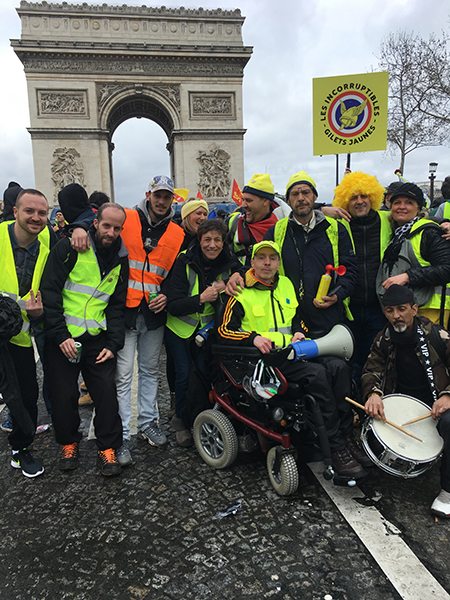Another Way of Life
“It appeared that everyone wanted to talk to a journalist from the United States with no visible axe to grind.”
When my cab dropped me off near the Place de l’Étoile in Paris on March 2, I was expecting the worst. I had already irritated my driver by asking him to take me to where the gilets jaunes, the “Yellow Vests,” were protesting, because he wanted to avoid the demonstrations and the police checkpoints at all costs. Moreover, there was always a possibility of violence during this sixteenth manifestation of public anger against French President Emanuel Macron and government policies the protestors say favor the rich at the expense of the lower middle class and the poor. Hooligans could well set some cars on fire again, and the CRS (Compagnies Républicaines de Sécurité), the riot police, might attack the hooligans, not pausing to differentiate between the actual demonstrators and journalists like me.

But at that moment—11:30 AM or so—all was calm around the Arc de Triomphe and in the vicinity of Avenue Kléber. I even saw some tourists strolling about as though nothing were going on. And in reality there was no reason for panic. When I eventually found myself in the midst of the gathering, just in front of the Rond-Point on the Avenue des Champs-Élysées, I was struck by the prevailing good humor. Basically, the gilets jaunes were behaving just like the tourists; they seemed delighted by the capital and happy to rediscover their comrades.
And it appeared that everyone wanted to talk to a journalist from the United States with no visible axe to grind. The first Yellow Vest I met was Dany Lemaire, a gray-haired security contractor from Val-d’Oise: “Coming down to Paris was obligatory,” he told me. He’d been fulfilling that duty ever since the beginning of the demonstrations, when he’d received an invitation to participate in them on Facebook. Together with his co-demonstrator “Guillaume,” who was wearing a yellow wig, he was calling for “fiscal justice,” including a “VAT reduction.” The government’s abolishment of the tax increase on fuel was a good thing, he thought, but it wasn’t enough to improve the lives of ordinary people. “Me and my wife together, we make only 6,000 euros a month,” Dany Lemaire pointed out.
None of this made Lemaire a revolutionary. That seemed an obvious conclusion to draw regarding a fifty-something man like him, and what Lemaire said next confirmed it: “In any case, we don’t want to overthrow the government. Macron’s our president.”
So what did they really want? Guillaume—who preferred not to reveal his name because he “works for a high-profile, blue-chip French cosmetics firm”—insisted on saying that they were “apolitical,” and that to speak of their demands in crude political terms was to miss the Yellow Vests’ essential goal: “We have to have another way of life.” This concept was enthusiastically supported by Natalie Bouekama, a civil servant in the Paris city hall, whose lack of specificity could explain why the attempt to develop a “Gilets Jaunes” ticket for the European elections—in other words, to engage in conventional politics— is fervently contested by many members of the movement.
I noticed something of the same attitude in one Jonathan Becker, a bearded thirty-one-year-old from Picardy who was brandishing a huge sign covered with some nevertheless quite specific demands (zero homeless, citizens’ initiative referendum, wealth tax; minimum pension 1500 euros/month, after taxes; stop fraud and tax evasion; renationalize the electricity, gas, and railroad companies) and with some others that were more philosophical and general (let the big pay big—let the small pay small; ban the sale of the property and patrimony of france). Nothing truly radical. In his other hand, Becker carried his region’s pretty flag, which was adorned with fleurs-de-lis and lions—a distinct contrast with other nearby flags, which were red and bore images of Che Guevara. The solemn and silent riot police, who were blocking the demonstrators from entering Rue Arsène Houssaye, may well have wondered whether they were dealing with royalist counter-revolutionaries or Bolsheviks. Becker, in any event, wanted a government that “listens to us and doesn’t just put on a PR show.”
He and others were wearing goggles for protection against tear gas though, as far as I could tell, the mood was not inclined to destruction or bloody violence. And, luckily, a bearded, amiable cop not wearing a riot helmet was going along the front line of demonstrators saying, “No use putting on your glasses, there won’t be any gas.” In fact, the march ended peacefully several hours later near the Barbès-Rochechouart métro station without any incidents or significant confrontations. The Yellow Vests’ refrain, “Paris, on your feet, rise up!” had announced a reunion of friends rather than a mass gathering of people blinded by hostility.
And that was when I got an idea about their fundamental motivation. When I had asked Dany, Guillaume, and Natalie if I could take their picture, they’d immediately invited other friends to pose with them—and the result was a sort of family portrait. Without minimizing the economic suffering of the Yellow Vests, I wondered if their weekly meetings weren’t also motivated by a feeling of isolation, and if they weren’t demanding not just equality but also human warmth and fraternity, a fraternity lost in the modern chaos of the Internet, vast superstores, and part-time work. The historian Jules Michelet described a similar consciousness before the 1848 revolution, an analysis that Évelyne Pieiller summarizes in the March issue of Le Monde diplomatique: “According to Michelet, the people recognize one another . . . far from the elites that imagine themselves cosmopolitan and detached from their homeland. . . . But this is not a question of ethnic patriotism.” In the historian’s words, “France is ‘more than one nation, it’s a living fraternity,’ and what makes ‘the life of this world’ is ‘the latent heat of its Revolution.’”


